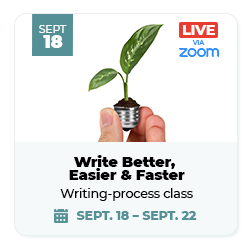Observational research brings your message to life
You’ve heard about MBWA, or management by walking around? Try WBHA, or writing by hanging around — going to the scene to observe.

Observational research is the most overlooked reporting tool there is. Which is a shame. Because firsthand observation gives your copy color and insight that you can’t get any other way.
“You can observe a lot just by watching.”
— Yogi Berra
Observational research means that you, the writer, experience the event or product or procedure so you can recreate the experience for your readers.
- Covering a new roller coaster? Get on that sucker and ride it.
- Doing a piece on a new medical procedure? See if you can get into the operating room.
- Writing about a new line of chocolates? You haven’t really done your job until you’ve sampled a box or two.
Why observational research?
Through observational research, you show your readers what they don’t ordinarily see, make them feel what they don’t normally feel. Observational research:
- Makes writing vivid
- Helps you recreate a scene you’ve witnessed
- Turns stick figures into portraits and adjectives into sensations
- Overcomes distance, putting readers in the scene, making them feel as if they were there
Go to the scene …
Hang up the phone, back away from the keyboard and go to the scene to observe. You can’t observe if you never leave your desk. So try these types of observational research methods:
- Spend a day (or an hour) with your subject matter expert as she goes about her regular business.
- Ask for a demonstration. Get the subject matter expert to show you how she found the computer glitch or otherwise demonstrate parts of the story for you. When writer Cynthia Gorney interviewed Theodore Geisel (Dr. Seuss) for the Washington Post, she asked him to draw one of his characters. As he sketched Yertle the Turtle, Geisel started talking about how he’d developed the character. That got the conversation rolling.
- Take a tour with the subject matter expert. Let the plant manager show you “how things work around here.”
- Find an action setting. Put yourself and your subject matter expert in a situation that reveals something about the topic. When I profiled a customer-service guru, for example, I took him to a white-tablecloth restaurant where I could observe him observing the service.
- Watch the subject in action, then talk. Be on hand while the surgeon performs surgery, for instance, then ask questions afterward.
Wherever you go, get out of your office.
… and observe.
Once you’ve left your desk for someplace more interesting, look for compelling details.
“Does a clock on the wall of a high-powered executive tick-tock relentlessly, like a metronome for his pressure-packed career?” prompts David A. Fryxell, former editor of Writer’s Digest. “Do the floors of the manufacturing magnate’s office tremble with the distant pulse of the factory floor? Does the home smell of freshly baked bread, the production plant of ozone, the farm of recently spread manure?”
Those are the types of details that grab attention and pull readers through your story.
Work with — not against — your brain
While we talk a lot about what to write — More stories! Fewer words! Shorter sentences! — we don’t focus so much on how.

Writing is hard because we weren’t taught how to write. Instead, we were taught how to edit: how to spell, punctuate and use the right grammar.
But there is a how to writing. Learn a few simple steps that will make your writing time more effective and efficient at How to write Better, Easier & Faster — our writing-process workshop starting Sept. 18.
You’ll learn to invest your time where it’ll do you the most good … stop committing creative incest … even save time by editing before writing.
Save up to $100 with our group discounts.
